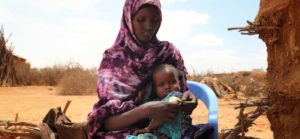The story of a determined mother and a traditional father in southwest Somalia, and Action Against Hunger’s work to help save the life of their severely malnourished daughter.
“Hey, Action Against Hunger, come here!” Xukun Muhumed calls out to her bubbly 21-month-old daughter Anzal. Her curious eyes gaze at the unfamiliar sight of a car parked nearby, and then she runs toward her mother, giggling.
It is hard to tell that this cheerful child is the same Anzal of five months ago. At 16 months, Anzal could not do many of the things other children of her age could do, like hold her head steady on her own. After she developed diarrhea, vomiting, and a fever, her appetite was poor and her neck became too weak to support the weight of her head.
Xukun, her mother, was devastated but determined. “I was pregnant with my last born then, but was ready take my daughter anywhere to save her life,” says the 28-year-old mother of six. Anzal’s father, however, felt differently. He had no hope that she would recover, and was resigned to losing his little girl to malnutrition.
Anzal and her family live in Aato, a village 25 miles west of ElBarde, a town in southwest Somalia. Her father Mohamud, 31, is a religious teacher at a local school and the sole breadwinner for the family of eight – they survive on his salary of less than 30 dollars a month.
As the disease progressed, Anzal refused to breastfeed because she had sores in her mouth. As the ailment took a turn for the worse, her parents brought her to a religious leader for remedy.
“Unfortunately, her condition was not getting any better. I was then advised to take her to the Action Against Hunger team, who were coming in a few days to visit our village,” Xukun says.
Zukun and Anzal arrived at the Action Against Hunger Outreach Center in Aato. After assessing her and seeing how severe her case was, the nurse recommended that Anzal should be referred to the Action Against Hunger Stabilization Center in ElBarde.

At the Outpatient Therapeutic Center in Aato, Health Educator Abdikarim measures Anzal.
Anzal’s mother was ready to take her daughter to the Stabilization Center with our team, but her father Mohamud – who did not believe that a medical intervention would change anything – rejected that proposition. “I told them not to take her away, I can bury her here. I was hopeless,” he says dejectedly. “I just lost my herd of 30 goats to the drought and here I was about to lose my daughter.”
In vain, the Action Against Hunger team tried to convince him to take Anzal into the Stabilization Center. One week later, the team came again to conduct another checkup.
“We checked on Anzal and found that she was still hanging on. We tried to give her dad our piece of mind and persuade him to change his stance, but he was adamant and stood his ground. We were disappointed. Thankfully, he reluctantly accepted on our third visit,” says Abdikarim, Action Against Hunger Health Educator.
“Even though I accepted it, deep down I felt it wasn’t the best decision – I was wrong,” Mohamud says.
When Anzal was finally admitted to the Stabilization Center, she was extremely emaciated. Her temperature was over 100 degrees, and she had a lot of trouble feeding due to sores in her mouth. Anzal was fed through a tube for four days, put on antibiotics and painkillers to relieve her fever, and given therapeutic milk to treat her severe malnutrition. Her response was immediate.
“On day two, she was no longer feverish and, within a week, her oral sores completely healed. She was able to feed well. Anzal responded to treatment well and she gradually gained weight by the day,” says Abdinur, one of the nurses at the Stabilization Center.

Health Educator Abdikarim did not give up on Anzal and her family. His persistence convinced her father, Mohamud, to send Anzal for lifesaving treatment at an Action Against Hunger Stabilization Center.
In the Stabilization Center, Xukun learned from Action Against Hunger health educators about health and nutrition, including ways to help keep her daughter healthy. When she had recovered enough, Anzal was transferred to a Action Against Hunger Outpatient Therapeutic program in her home village of Aato, where she continued to receive nutrition treatment for two months.
Finally, she was transferred to the Action Against Hunger supplementary feeding program for another two months before she was discharged. When she returned home, Anzal continued to be closely monitored by Action Against Hunger Community Health Workers to ensure that there was no possibility of relapse.
“I nicknamed Anzal ‘Action Against Hunger’ because they saved her life,” Xukun says.
“Anzal’s case has eased our referrals from Aato. Now every parent believes that, if Anzal made it, their children can make it, too,” Abdikarim says.
Action Against Hunger’s Food Security and Livelihood team in ElBarde are planning to include Xukun in their upcoming Cash for Work program to help her earn an income to support her children and prevent another case of malnutrition in her family.
Action Against Hunger







































